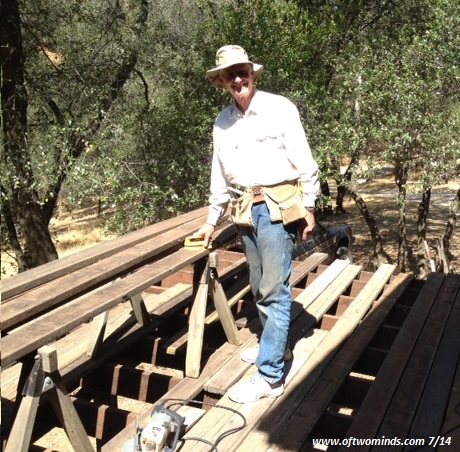
The joys of being productive do not become stale with the passage of time.
The joys of consuming are familiar to us all–a good meal, a cold beverage, a fine article of clothing, a new gadget, a new travel experience, another cosmetic procedure.
We’re flooded with messages emphasizing the joys of consumption. Consuming more is what powers the global economy and more specifically, profits.
Governments need profits to tax, and companies making profits to hire workers who then pay taxes. So it has become a perverse patriotic duty to consume more, especially if we have to borrow money to do so, as that debt boosts bank profits.
Lost in the frenzy to persuade us to consume more and take on more debt are the joys of producing. We’re all expected to master the processes of consumption–comparison shopping, obtaining credit cards, etc.–yet our culture rarely makes room for the joys of being productive and thrifty, i.e. reusing materials, repairing useful things, creating art from leftover supplies, etc.
Consuming is fun, but so is being productive. Here’s a photo from a fun deck building project I participated in this summer–re-using old redwood planking to replace rotted fir decking. Watch where you step–especially with a 17-pound Skil 77 worm drive power saw in hand….

The joys of using tools and one’s skills cannot be overstated. Tools become like old friends after many years of experience; these include all sorts of tools, from sewing machines to saws to woks to lathes–the list is endless.
For me, the Skil 77 worm drive offers a combination of familiarity and power that is very comfortable. Other power saws feel twinkie, underpowered or unbalanced, and I have to think about the process of cutting in a way that requires no thought at all with the Skil 77.
The Taoists of ancient China understood that the Tao (in modern terminology, the zone) flows from mastery gained from focus and experience. Once a tool becomes an extension of one’s body, one no longer needs to focus on the tool or process.
This characteristic of mastery is captured in this story from Chapter 19 of The Complete Works Of Chuang Tzu (Translated by Burton Watson):
Yen Yuan said to Confucius, “I once crossed the gulf at Goblet Deeps and the ferryman handled the boat with supernatural skill. I asked him, `Can a person learn how to handle a boat?’ and he replied, `Certainly. A good swimmer will in no time get the knack of it. And, if a man can swim under water, he may never have seen a boat before and still he’ll know how to handle it!’ I asked him what he meant by that, but he wouldn’t tell me. May I venture to ask you what it means?”Confucius said, “A good swimmer will in no time get the knack of it – that means he’s forgotten the water. If a man can swim under water, he may never have seen a boat before and still he’ll know how to handle it – that’s because he sees the water as so much dry land, and regards the capsizing of a boat as he would the overturning of a cart. The ten thousand things may all be capsizing and backsliding at the same time right in front of him and it can’t get at him and affect what’s inside – so where could he go and not be at ease?
Part of this internalized awareness is respect for the power of tools. That the saw can take off a finger in a split second is never out of my awareness, just as it is natural to position myself to avoid kickback. Cockiness has no place in mastery. Mastery is about skills doing the work themselves, not reveling in the possession of skills.
Bruce Lee expressed this state of mind in this way:
A good martial artist does not become tense, but ready. Not thinking, yet not dreaming. Ready for whatever may come. When the opponent expands, I contract; and when he contracts, I expand. And when there is an opportunity, “I” do not hit, “it” hits all by itself.
The joys of consumption are intrinsically limited. We are soon sated by food, new clothing soon loses its charms, and the exotic locale becomes commonplace.
The joys of being productive, in contrast, do not become stale with the passage of time. If anything, skills and tools are welcomed as old friends, their value burnished rather than depleted by experience.






















